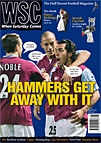 Dear WSC
Dear WSC
As a born cynic (and Northerner) this is very hard for me, but with regards to Colin Smith’s letter in WSC 245 I feel I must write in defence of the new Wembley. I wanted to hate it, I really did, but after attending the Blackpool v Yeovil play-off final I, or should I say we, as the friends I went with felt the same, just couldn’t find anything to complain about. OK, maybe that’s hyperbole – the empty ring of Club Wembley seats was a bit annoying on the eye, as was the over-exaggeration of the stewards when a nearby bloke pulled a cigarette, and not an Uzi, out of his pocket. But outrageously priced food and drink? I don’t know where Mr Smith got his hotdog from, but I paid £5 for the most edible burger I’ve ever had inside a football ground, and as for £3.50 a pint being extortionate even for London, I take it that he didn’t sample the delights of Soho after the match. It seems we’ve turned into a nation of whingers who will complain just for the sake of it – take the furore over the 2012 Olympic logo. For once, let’s just give credit where it’s due. Yes, it was vastly over time and even more over budget; yes, I’ll miss the internationals being played around the country; and an even bigger yes, I’ll miss falling out of a pub and being in my seat within ten minutes à la Cardiff. But the new Wembley is a fantastic stadium, unrecognisable from the eyesore it replaced. And things could be worse – I’m going to have to go to Deepdale and Turf Moor next season.
Jason Taylor, Hadfield
Search: ' Johnny Rep'
Stories
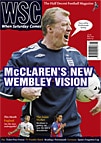 English pundits are widely seen as bland, irritating sycophants, but in Ireland Eamon Dunphy and friends pull no punches on RTE, earning popularity with viewers if not managers. Paul Doyle reports
English pundits are widely seen as bland, irritating sycophants, but in Ireland Eamon Dunphy and friends pull no punches on RTE, earning popularity with viewers if not managers. Paul Doyle reports
So you’re assigned the task of creating a panel of people to inform and entertain television viewers before, during and after football matches: what do you do? If you work for the BBC, you round up a giggling gaggle of self-satisfied golfing buddies and tell them to inform and entertain no one but themselves. If you work for Sky, you collar some besuited former footballers and order them to rehearse bland cliches and beatific grins in preparation for a hard day’s cheerleading. If you work for Irish state channel RTE, however, you hire abrasive codgers who can be relied upon to call a spade a spade, a bungling manager “a boil on the arse of humanity” (Eamon Dunphy on Mick McCarthy) and, just for kicks, BBC pundits “spoofers and muppets”.
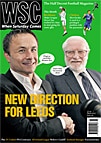 Monday 1 Manchester United miss a chance to go nine points clear, drawing 2‑2 at injury-hit Newcastle. Liverpool’s 3‑0 win over Bolton takes them third. “They’ve shown me in the last couple of weeks why they are down there,” says Alan Curbishley as West Ham crash 6‑0 at Reading, their third successive defeat. Wigan drop to 17th after a fifth straight loss, 3‑0 at home to Blackburn. Antti Niemi is hospitalised with a serious neck injury in Fulham’s 0‑0 draw with Watford. Derby’s 2‑1 win at Preston takes them to within three points of Championship leaders Birmingham, beaten by a 90th‑minute goal at Ipswich. Torquay are six points adrift in League Two after losing 1‑0 at Bristol Rovers.
Monday 1 Manchester United miss a chance to go nine points clear, drawing 2‑2 at injury-hit Newcastle. Liverpool’s 3‑0 win over Bolton takes them third. “They’ve shown me in the last couple of weeks why they are down there,” says Alan Curbishley as West Ham crash 6‑0 at Reading, their third successive defeat. Wigan drop to 17th after a fifth straight loss, 3‑0 at home to Blackburn. Antti Niemi is hospitalised with a serious neck injury in Fulham’s 0‑0 draw with Watford. Derby’s 2‑1 win at Preston takes them to within three points of Championship leaders Birmingham, beaten by a 90th‑minute goal at Ipswich. Torquay are six points adrift in League Two after losing 1‑0 at Bristol Rovers.
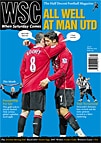 It’s time for a little optimistic thinking. Six WSC writers say how they would shake up the game this year, if the football genie appeared to them and granted them one wish
It’s time for a little optimistic thinking. Six WSC writers say how they would shake up the game this year, if the football genie appeared to them and granted them one wish
Downgrade Managers
Think of any Premiership manager: you’ll probably be able to hear his voice too. Sam Allardyce, for example: “We have a problem in this country playing to our traditional strengths.” Stuart Pearce: “Maybe I’m too honest, but that’s just me.” Rafa Benítez: “We play technical very good first half.” Even proven duds such as David O’Leary (“I’m not criticising those players in that dressing room”) and Graeme Souness (“Was it a penalty? You tell me”) have an easily recognisable presence in the white noise of football sound bites. It’s easy to forget that it hasn’t always been like this; and that one of the most consistently irritating side-effects of 15 years of Premiership overexposure has been the revolution in the public profile of managers.
The abnormally high profile of the current crop adds nothing to the spectacle of going to a match. Even their physical presence is a distraction, creating a compelling case for abolishing the “technical area”. What form of entertainment wouldn’t be ruined by the intrusion of an angrily gesturing Portuguese in the corner of your vision; or, on TV, the back of a fiery Ulsterman’s head repeatedly popping up at the bottom of your screen? Exhibitionist, embarrassing dad-style “coaching” from the sidelines should be classified as ungentlemanly conduct and deemed a bookable offence. Volleying the ball back, putting your arm around the fourth official’s shoulder, getting in on the goal celebrations: these are all very new and deeply undesirable things. Only the reintroduction of proper dug-out dugouts, populated by scowling men in horrible coats, can put an end to it all. Not to mention a three-day embargo on any form of managerial public comment before or after a game. They’d soon stop doing it.
There was a time when managers barely got a look in. Walter Winterbottom was England manager for the catastrophic 6‑3 defeat by Hungary at Wembley in 1953.There wasn’t a single reference to him in the hand-wringing press reports the following day. The national press singularly forgot to morph his head into a cauldron of goulash. So little-regarded was the job of “trainer” that Winterbottom’s name simply wasn’t mentioned. This state of affairs lasted until the appointment of his successor, Alf Ramsey, but even the celebrity managers that followed were really only on TV very occasionally compared to, say, Carlos Queiroz or Alan Pardew. Brian Clough’s celebrity gained its momentum from the impressions of Mike Yarwood and a million playground mimics.
In recent times, the need to manage “the media side of things” has led to appointments, and even whole careers, that would otherwise barely have got off the ground. Nobody can be good at everything; the general standard of nuts-and-bolts football management is bound to have suffered as a result. Can anyone even remember what Bob Paisley’s voice sounded like? As recently as the early 1980s, talking a lot on television just wasn’t in the job description. Paisley still seemed to do all right for himself. Imagine how much more interesting, and how much more widely respected, José Mourinho might be if he just kept on winning things without feeling the need to make a daily public pronouncement.
Barney Ronay
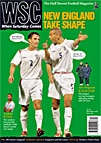 Football's popularity soars as Pompey are only the second southern team to become Champions, Mike Ticher writes
Football's popularity soars as Pompey are only the second southern team to become Champions, Mike Ticher writes
The long-term significance
Never has football been more popular than in the third full season after the war. Or, to put it another way, never have people’s lives been so bereft of entertainment and escape that they gorged themselves even on the Third Division South. Clothes rationing ended in 1949, but half-time tea and sugar were still restricted until the 1950s, as were petrol and soap. Almost 18 million glamour-starved people watched First Division football (compared with nearly 13 million for the Premiership last season). But the most remarkable figures were in the third divisions, where the presence of Raich Carter and Tommy Lawton pushed average crowds above 30,000 at Hull and Notts County, respectively. Seven current League clubs drew their record crowd that season.